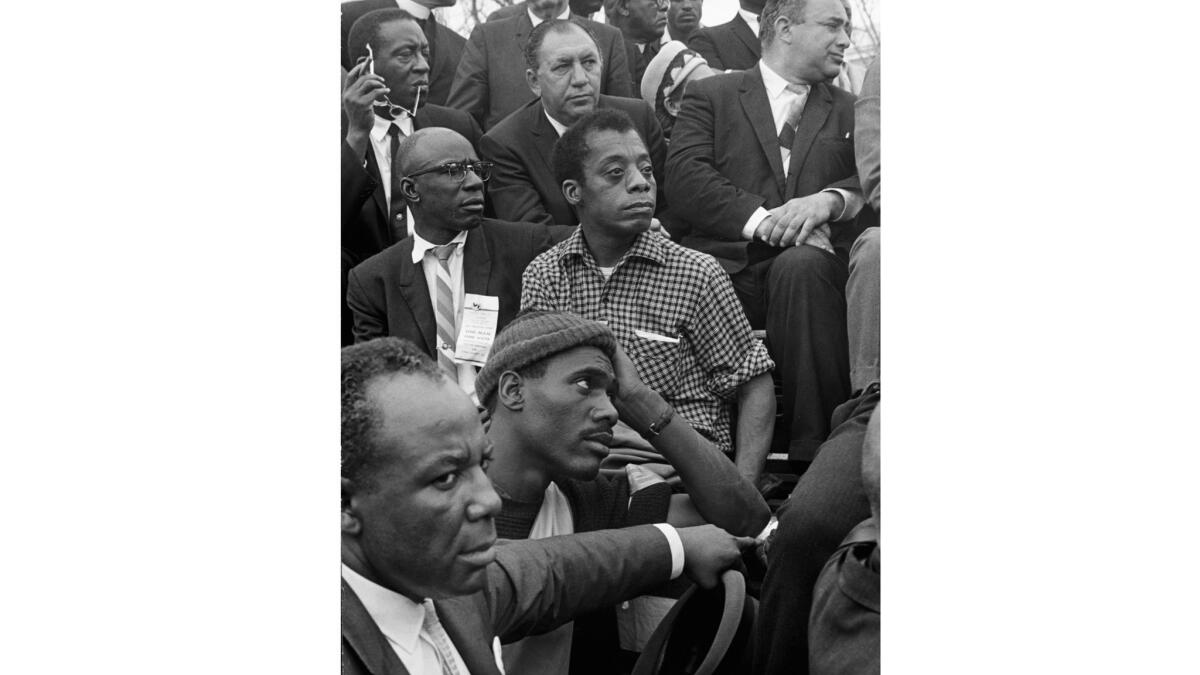Happy birthday, James Baldwin!
- Share via
Happy birthday,
Baldwin grew up in Harlem, the son of Emma Jones and the stepson of David Baldwin, a Baptist minister who was abusive to James and his eight younger half siblings. Baldwin served as a youth minister as an adolescent and was recognized by his teachers in school for his gift for writing.
One of those teachers was Countee Cullen, a poet who gained fame during the Harlem Renaissance of the 1920s, taught Baldwin in junior high and later became a mentor to the young writer.
In the early 1940s, Baldwin moved to Greenwich Village and fell in with artists and writers, including Richard Wright. At 24, sick of the racism he experienced in America, coming to terms with his homosexuality and with a literary fellowship, Baldwin moved to France. For the rest of his life, he called France home, apart from stints in the U.S., where he was frequently invited to teach.
Baldwin discussed his decision to leave the U.S. in a 1984 interview with the Paris Review.
"It wasn’t so much a matter of choosing France — it was a matter of getting out of America," he said. "I didn’t know what was going to happen to me in France, but I knew what was going to happen to me in New York.”

Did you know?
- Baldwin made his literary debut in 1953 with “Go Tell It on the Mountain,” a novel inspired by his own childhood in Harlem and his ambivalent relationship with religion. The reviews were rapturous; the New York Times called it a “beautiful, furious first novel.”
- Three years later, Baldwin published “Giovanni's Room,” a novel about a young American living in Paris and his relationship with an Italian man. The book shocked many, who were not used to frank depictions of homosexuality in mainstream fiction.
- Baldwin would go on to write several more books over the next decades, including the influential essay collection "The Fire Next Time" in 1963 and the novel "If Beale Street Could Talk" in 1974.

- The last two books Baldwin published in his lifetime were the essay collections "The Evidence of Things Not Seen" and "The Price of the Ticket" in 1985.
- In 1987, Baldwin died of cancer in Saint-Paul-de-Vence, France, where he had moved in 1970. The Rev. Jesse Jackson, responding to the news that Baldwin had died, said, "He was a great advocate of personal and racial freedom. He was one of the giants."
- Recently, Baldwin has returned to the public eye, almost 30 years after his death. Last year saw the release of "I Am Not Your Negro," a documentary about civil rights based on Baldwin's "Remember This House," an unfinished manuscript by the author. Times film critic Kenneth Turan called the documentary "a mesmerizing cinematic experience, smart, thoughtful and disturbing."
- Barry Jenkins, director of the Oscar-winning film "Moonlight," acknowledged that his movie was heavily influenced by Baldwin's work. "I describe ‘Moonlight’ as sort of the child of ‘Giovanni’s Room’ and ‘The Fire Next Time,’" Jenkins said. "What I love about what Baldwin does is that the plot is important, but the emotions are much more what he’s about. That’s the way ‘Moonlight’ works too."
- Last month, Jenkins announced that his next film would be an adaptation of "If Beale Street Could Talk." Jenkins said, in a statement, "To translate the power of Tish and Fonny’s love to the screen in Baldwin’s image is a dream I’ve long held dear. Working alongside the Baldwin Estate, I’m excited to finally make that dream come true."
- Writer Ta-Nehisi Coates, whose “Between the World and Me” won the National Book Award for nonfiction in 2015, was inspired by Baldwin in terms of both how he addressed racial inequalities and his literary style. "Baldwin was a writer, first and foremost. The ‘Fire Next Time’ is a beautiful work of art,” he told Rolling Stone. “And I really wanted to make something beautiful."
Sign up for our Book Club newsletter
Get the latest news, events and more from the Los Angeles Times Book Club, and help us get L.A. reading and talking.
You may occasionally receive promotional content from the Los Angeles Times.







